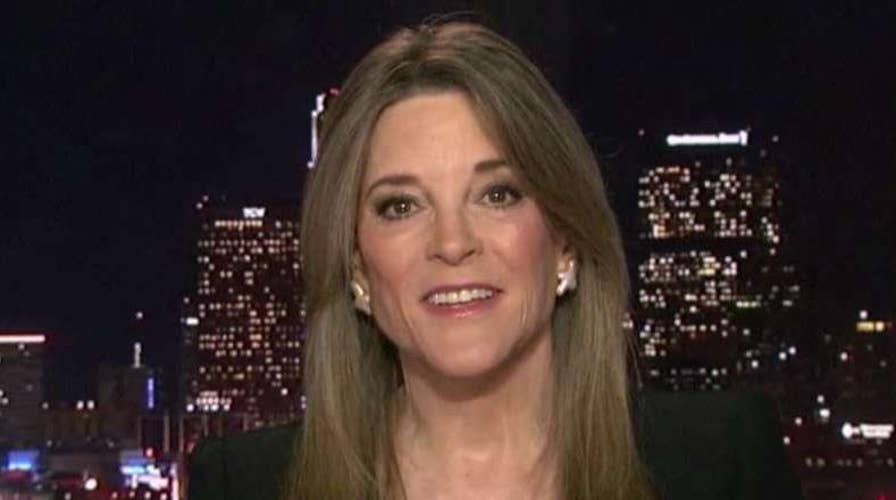Williamson: The mean spiritedness in politics has been damaging
2020 Democratic presidential candidate Marianne Williamson talks her bid for the 2020 nomination and primary debate qualifications on 'Fox News @ Night.'
CONCORD, NH – Democratic presidential candidate Marianne Williamson has a message for the Democratic National Committee.
The best-selling spiritual author and philanthropist turned Democratic presidential candidate says the DNC’s “job should be to help us [the candidates] get in front of the voters.”
FIRST 2020 DEMOCRATIC DEBATES TO BE HELD IN MIAMI IN LATE JUNE
With five weeks to go until the first of the DNC-organized presidential primary debates kick off, the long-shot for the nomination who's pushing to make the debate stage is taking aim at the national party committee’s criteria.
“I don’t believe the political parties should be gatekeepers. They should be conduits and channels that should serve the process, not design the process,” Williamson said Tuesday in an interview with Fox News and NHTalkradio.com while campaigning in the first-in-the-nation primary state of New Hampshire.
In February, the DNC announced two ways the candidates could reach the debate stage. One is registering 1 percent or more support in three qualifying national or early primary or caucus voting state polls released between Jan. 1 and 14 days prior to the date of the first showdown. The other is receiving donations from at least 65,000 unique donors and having a minimum of 200 unique contributors per state in at least 20 states.
Each month, the DNC plans to hold two debates – on consecutive nights – with 10 contenders debating each evening. But with an historic two-dozen candidates now vying for the Democratic nomination, low-polling candidates are worried they'd have to meet both criteria to make the cut.
WILLIAMSON TELLS FOX NEWS 'WE HAVE SWERVED AWAY' FROM COUNTRY'S FOUNDING PRINCIPLES
Williamson announced recently that her campaign reached the 65,000 individual donors criteria. But she's not among the dozen contenders who've so far reached both thresholds.
“Now, there’s another hoop. Well, we’ll jump through that one. I placed in the CNN poll. I placed in the Fox poll. I need to place in one more poll,” she explained.
But the candidate railed against the process, stressing that “that’s not what this should be about.”
“This is not what we should be spending our time on. Everybody’s desperate, please, for those 65,000. This is what’s wrong with our democracy. The American people should decide. So they’re saying that they can only have ten people on each night. Why? So have 12 people on. Have 11 people on. Why should it make such a big difference,” Williamson pleaded.
Having debates on sequential nights equally and randomly divided in two groups of 10 was by design, as the DNC was determined to avoid the controversial varsity and junior varsity debates the RNC held for its extremely large field of candidates in 2016.
The DNC also wanted to appear more inclusive and open to grassroots candidates, after the party was slammed in the 2016 cycle for trying to stack the deck for eventual nominee Hillary Clinton at the expense of upstart Sen. Bernie Sanders of Vermont.
“If the DNC had not put their finger on the scales and let the people decide, and everybody had felt very clearly that whether it was Hillary or Bernie, that it was the people who had truly decided, then I think the Democrats would have one because so many people wouldn’t have stayed home,” Williamson said.
And she hoped that the DNC’s “not going to run those same kind of games this time, and this doesn’t bode well that this is happening now, with the 65,000 and these other shenanigans.”
Pointing to the national party committee’s role in organizing the debates, Williamson asked “why are guys even in there…I hope that this process will be genuinely democratic. Let the people decide.”





